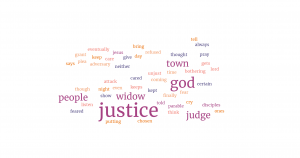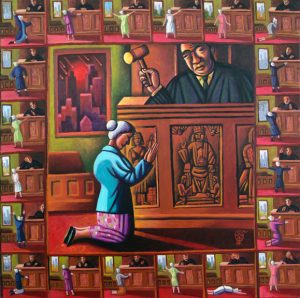Nerys writes:
As you prayerfully read today’s Gospel passage, Luke 18.1-8, I wonder if you will be struck by a particular word or phrase.
I had always thought of Jesus’s comic story of the shameless judge and the determined widow as being about our private prayer. I understood it as encouragement for those who were discouraged, disappointed or despairing, like Luke’s first readers living in a time of persecution, to pray always and not to lose heart. As I read the parable this week, however, the word ‘justice’ jumped out at me and I realised that it appears in the passage more often than any other word.

We don’t know why this vulnerable woman needed to come before the judge. All we are told is that she was seeking justice. She asks him to ‘grant me justice against my opponent’, or literally ‘against the one who has treated me unjustly’. The judge, however, has no sense of right or wrong. He is someone who doesn’t fear God or care what people think of him. Despite her plea, the unjust judge does nothing. The poor widow is powerless before him but her faith in justice drives her to persevere. She ignores her own low status, she ignores all social conventions and proprieties. At the gate of the city, an area dominated by men, she keeps on coming, speaking out, making a nuisance of herself with her loud persistent pleading for justice until finally, realising that she is not going to give up, the judge relents and does the right thing. In the original Greek, he says, ‘because this widow causes trouble for me, I will give her justice, so that she may not, in the end, give me a black eye by her coming’. The image from the world of boxing is comic, but it also conveys the force of this feisty woman’s determination to obtain justice.
It is clear that the American artist, James B. Janknegt, is very aware of the ironic humour in Jesus’ teaching. After you have read Luke 18.1-8 again, you may wish to spend some time exploring his modern interpretation of the parable.

Jesus holds the widow’s fighting spirit up for admiration whilst contrasting the corrupt and selfish judge with God who is just and compassionate. If such a rotten judge can be persuaded to do the right thing just by being pestered, he infers, how much more will God act with speed to help his children when they call out to him? We offer our prayers within a relationship of love and confidence to God who cares passionately about us and about justice, so we should never be discouraged or tempted to give up.
Luke has Jesus speak these words on his way to Jerusalem where the faith of his disciples in justice was to be greatly tested. In his teaching, he is preparing them for the difficult times ahead. The passage finishes with a question which contains a warning: ‘When the Son of Man comes, will he find faith on earth?’ The disciples would have known exactly what Jesus meant, for he had just been talking with them about his eventual return, when every injustice would be righted and the whole world restored to what God intended. His two unforgettable characters represent two different attitudes to the coming of God’s kingdom. Which of these two attitudes, Jesus asks, will he find among his followers when he returns? Will they have given in to the desire for a quiet and comfortable life, or will they have remained committed to fight for justice whatever the cost?
This is a challenge for us today where we find power-hungry people and unjust and corrupt systems causing poverty, suffering and death. We often feel powerless to make a difference but Jesus’s story encourages us to keep on praying. It reminds us that prayer is not a passive activity if, in our prayers, we actively seek and pursue God’s will for justice in our lives and in the world.
I invite you to spend your time of prayer this morning calling on God to help you to seek justice for those who are exploited and oppressed:
- for the people of Ukraine whose lives are being destroyed by an unjust war
- for the people of African countries who are facing starvation because of human greed
- for people forced to seek asylum who are being treated with hostility instead of hospitality
- for the victims of modern slavery
- for those imprisoned unjustly or facing unjust punishment for their crimes
- for people in this country descending into poverty because of political decisions which favour the rich
- for people being discriminated against because of their race or colour, age, gender or sexuality
- for families where there is violence, conflict or broken relationships






